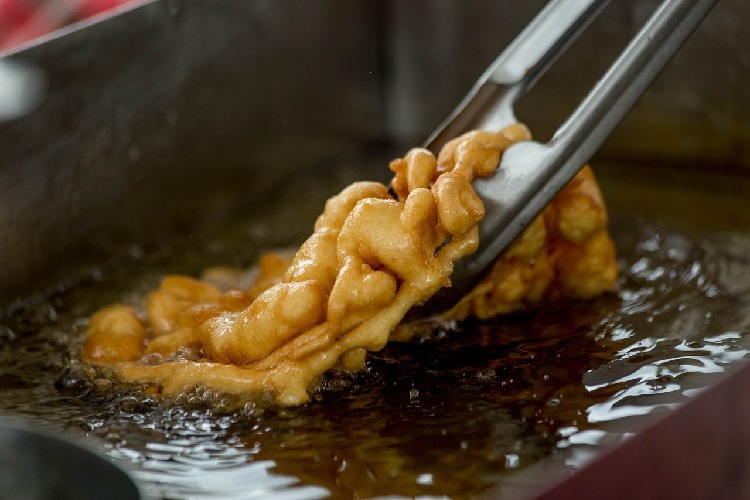
How to Properly Dispose of Bacon Fat and Cooking Oil
While there are several culprits behind a kitchen sink drain clog, grease and old cooking oil residue is the typical reason. This is due to the cooling of hot fat as it rolls down your drain. As it becomes colder, it hardens along the walls of your pipe, which eventually leaves to blockages and slow drainage times.
Best Methods for Keeping Your Drain Free of Grease and Oils
Every year, cities around the United States experience sewer overflows because of residents improperly disposing of cooking oil and fat. This exposes the general public to health risks from backed-up wastewater but can cost a homeowner thousands in plumbing repairs. As mentioned above, garbage disposals don’t really handle grease, but leftover food particles. That’s why you should always avoid pouring any cooking oil or leftover fat into your kitchen sink drain.
Consider these top tips for properly disposing of leftover grease:
Grease Belongs in the Garbage Can
The kitchen sink should be off-limits for grease and leftover cooking oil when cleaning up after dinner. Any greasy food scraps on your plate should go straight into your trash can and not your garbage disposal. Using a small strainer in your sink drain will also catch additional greasy particles and prevent them from building up in your pipes.
Wipe Away Cooking Fat
After cooking bacon, hamburgers, or other fatty meat products, you can leave it to cool down and solidify. This step makes it easy to wipe away the excess directly into your kitchen trash can and not risk clogging up your drain. It’s always a good habit to use a paper towel to mop up any greasy residue on pots and pans before washing them.
Collect Leftover Oil and Grease in a Soup Can
Oil doesn’t firm up quite like grease does after cooling down, but you can still contain the mess by pouring it into a repurposed spaghetti jar or soup can. Once it’s full, just toss it into the garbage on your way to take it out to the curb on collection day.
Recycle Large Amounts of Cooking Oil
Families that use a lot of cooking oil in a deep fryer should collect it until there is enough to take to a recycling facility. These organizations typically receive it at no cost, and many local government agencies have resources for disposing of large amounts of these products.
You Accidentally Spilled Grease or Oil Down the Drain
The good news is that it takes more than one spill to clog up your pipes but to help this waxy substance make its way through your plumbing, boil water and pour it down your drain a few times a week. The heat will liquefy any grease lining your drainpipe and help it move further along.
Another maintenance is vinegar, baking soda, and boiling water. This solution will break apart oil and fat residue while making your drain smell better. Ammonia is another option for cleaning away unwanted grease and cooking oil.
Consequences of Poor Grease Disposal Practices are Costly
When you pour grease down your kitchen drain regularly, you will eventually suffer a clog. The severity is hard to predict, but many warning flags before a total blockage includes:
- Poor drainage flow
- Gurgling sound when draining
- Bad odor
Once a blockage occurs, you risk sewage backing up from the point of the clog back into your kitchen or other areas of your home. That’s right. Depending on the layout of your sewage plumbing, a blocked line could affect a laundry drain area, cause a toilet to overflow all over your bathroom floor, and more.
Schedule a Dumpster Rental for Sewer Damage Repairs
Sewer overflow due to grease clogs in your drain is very costly due to the toxic materials in sewage. If you have wooden floors in your bath area, and your commode overflows from a grease clog further down the drain line, you will have to not only pay for clean up and sanitation but possibly have to replace it all. This means hiring plumbers, carpenters, and probably renting a dumpster to manage all the debris from the repair.
Bin There Dump That provides premier dumpster rental services, including cleaning up the area where the bin sat after we haul it out. No one cares about customer experience as we do! Call our Athens area office at (770) 932-2838 or contact us online for more information today. Check out our blog for additional tips and tricks to maximize the benefits of your dumpster rental experience!
Remember to use Bin There Dump That for all your dumpster needs.
Related Blog Posts
- Revive Your Home for Spring with This Spring Home Maintenance Checklist
- 10 New Home Trends That Will Make Your Friends Jealous
- How Our Dumpsters Support Realtors and Property Managers: A Comprehensive Guide
- 12 Jaw-Dropping Clutter Statistics That Will Make You Want to Declutter Today!
- Unlocking Space: The Complete Guide on Pocket Door Installation
- Step by Step Guide on How to Install Carpet Like a Pro


